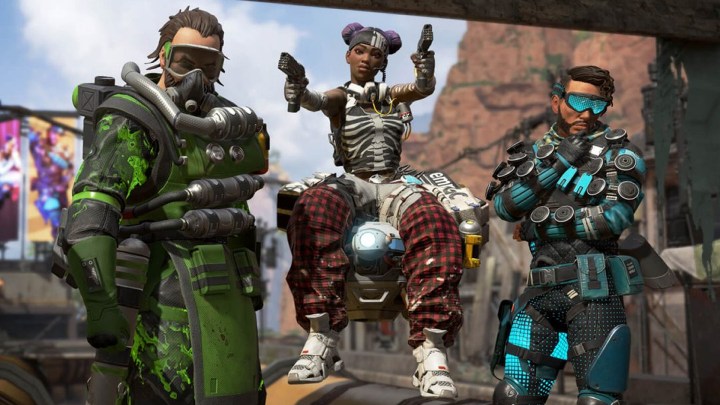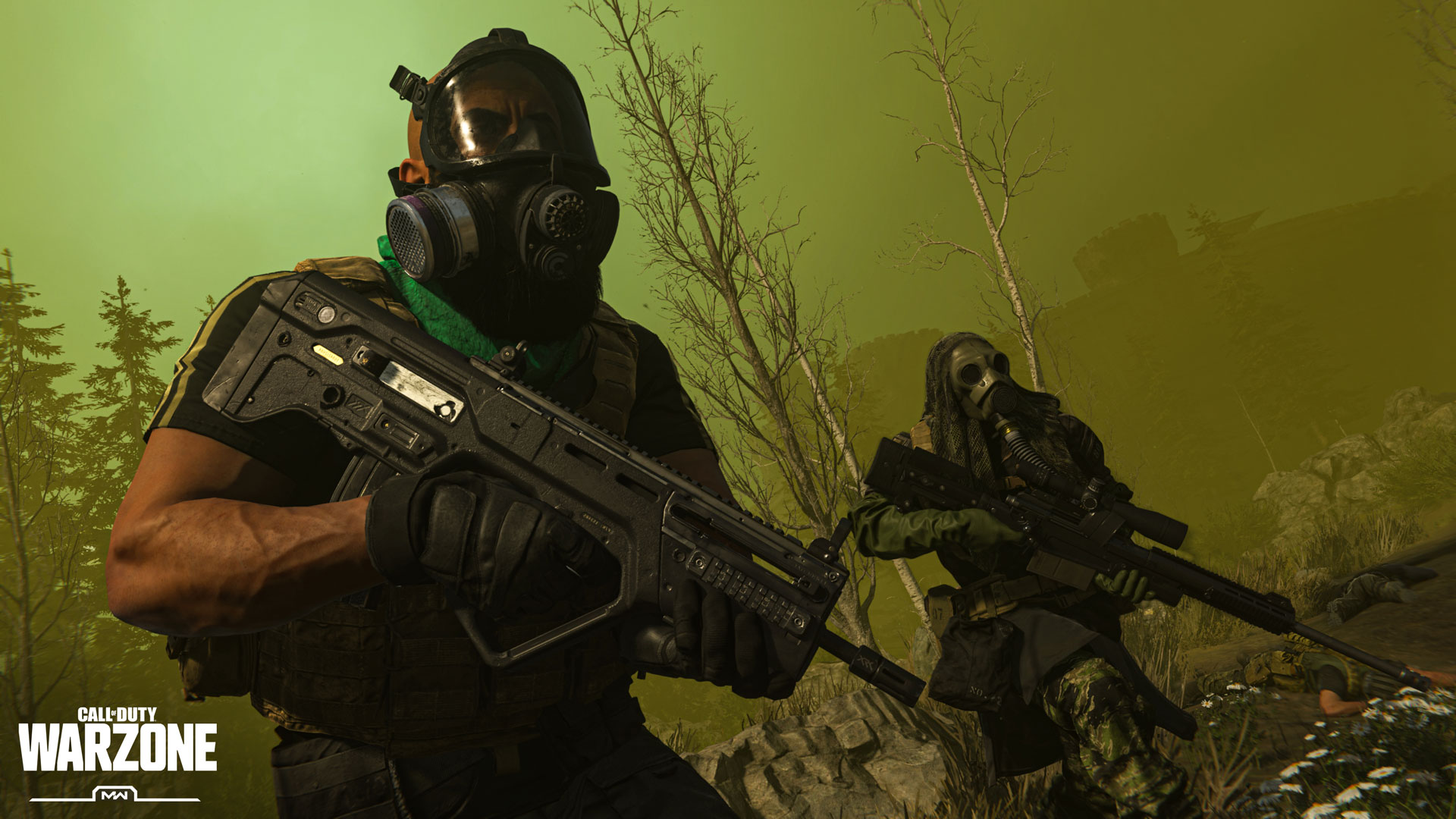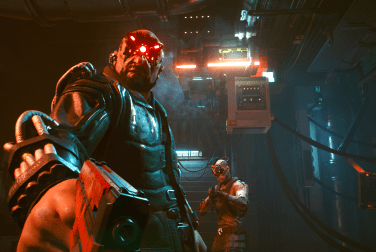
It took us some time to fully grasp Cyberpunk 2077, as it presents a unique experience. The game unfolds in a manner reminiscent of traditional tabletop role-playing games rather than a typical video game. While certain elements may feel recognizable, others will challenge your natural inclinations.
Polygon’s introductory guide to Cyberpunk 2077 is packed with valuable insights, strategies, and clarifications that would have been beneficial to know from the outset. We aim to clarify the game for you, sharing the knowledge that took us considerable time to acquire regarding its rhythm, dialogue, character classes, abilities, precision shots, side quests, loot discovery, and the importance of pursuing optional tasks.
Please be aware that due to multiple updates altering many features of Cyberpunk 2077 since its initial release, the information provided here may no longer be current. For insights into the changes made since the game’s launch, check out our review of Cyberpunk 2077 Phantom Liberty, which also discusses the 2.0 update.
Take your time.
Contents
- 1 Take your time.
- 2 Embrace curiosity.
- 3 No lessons except those you create yourself.
- 4 Attribute Points and Perk Points allow you to purchase various options.
- 5 Allocate Attribute Points and Perk Points strategically when they can have a significant impact.
- 6 You may find headshots to be underwhelming.
- 7 Side gigs are prevalent, yet they are easy to handle.
- 8 Take it easy.
- 9 Frequent saving is essential.
- 10 Rapid search for treasures
- 11 Fulfill additional optional goals.
Cyberpunk 2077 blends elements of action and role-playing genres, yet it does so in a unique way. Players can dedicate countless hours to exploring, navigating, forming connections, sneaking in, hacking, and uncovering the secrets of Night City, all while experiencing action sequences that can compete with major Hollywood films.
Anticipate a campaign that focuses significantly on role-playing throughout the main storyline. If you have experience with tabletop RPGs, consider it more as an ongoing campaign instead of a single-session adventure.
We want to address this upfront since it can be quite surprising, and we wish we had been aware of it beforehand. Cyberpunk 2077 takes its time, and you should, too.
Embrace curiosity.
Engage in role-playing as a dialogue partner, seizing every chance to inquire about the optional questions marked in blue. This will enhance your understanding of the world, the very place where you will be immersed. Knowledge serves as a remedy for uncertainty, especially in the complex realm of Cyberpunk 2077, which contrasts sharply with our own reality.
No lessons except those you create yourself.
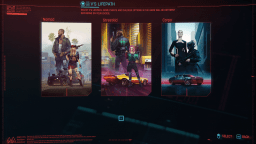
Image credit: CD Projekt Red as featured on Polygon.
At the start of the game, players are required to select from three distinct backstories: Nomad, Streetkid, and Corpo, which represent V’s Lifepath. Unlike traditional game classes, these backstories serve to shape the narrative and personality of V, the protagonist, rather than defining gameplay mechanics.
Every version of V starts with the same initial build, although each features a unique introductory prologue mission. The primary distinction lies in the backstory, which adds a touch of personality to your character.
Throughout the game, you’ll accumulate experience points that you can invest to shape your character, V, according to your preferences. Choose whatever you wish for any reason that you find fitting.
Attribute Points and Perk Points allow you to purchase various options.
Attribute Points and Perk Points allow you to unlock various options. By investing more of these into V, you enhance the range of abilities and actions available to them.
- Attribute Points enhance V’s strength and improve overall capabilities in key areas such as Body, Reflexes, Technical Skill, Intelligence, and Coolness.
- Perk Points provide advantages within Skill trees that are organized under various Attribute categories.
If you want to play stealthily, for example, pump Attribute Points into Cool, which increases Crit Damages, Resistances, and Detection Time. If you want more cool stealth-focused moves, spend a Perk Point on Hidden Dragon, which is a perk available in the Stealth skill (Cool > Stealth >You can execute non-lethal aerial takedowns on unsuspecting targets after acquiring the Perk.
Here’s an alternative perspective on how the Character menu in Cyberpunk 2077 is structured:
- Attribute > Skills > Perks
- Cool > Stealth >Concealed dragon
Looking to gain access to every door in sight? Invest in Body (strength) to break them down or enhance your Technical Ability to unlock them. Prefer to outsmart your foes on the streets rather than charging in with weapons? Focus on Intelligence, which boosts your cyberdeck RAM capacity (similar to mana or magic points) with every level you achieve.
Allocate Attribute Points and Perk Points strategically when they can have a significant impact.
In Cyberpunk 2077, you are required to allocate points during the character creation phase, a time when your understanding of the game is quite limited. There are no definitive right or wrong choices, so trust your instincts. The choices you make at the beginning won’t lock you into a specific play style.
As you engage in gameplay, you will continue to gather points, gain experience points (XP), and advance in levels. If you’re similar to us, you might not have a clear idea of how to utilize these points for some time.
Our approach: Gather them until you’re certain they will have an impact.
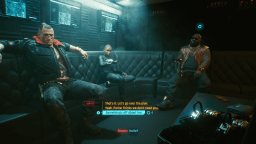
V can only express that “Something’s off about her” if they possess a minimum of 4 Attribute Points in Reflexes. Image: CD Projekt Red via Polygon.
For instance, you’ll engage in numerous discussions, and sometimes, a dialogue choice necessitates a specific Attribute level. As illustrated in the image above, an icon appears next to the dialogue, indicating the minimum Attribute requirement to express your thoughts. This icon aligns with the Attribute categories in your Character. In nearly every instance, you can access the menu and allocate points to the appropriate category—Body, Reflexes, Technical Ability, Intelligence, and Cool—while in the midst of a conversation. Once you return to the game, you’ll be able to express yourself freely.
This extends far beyond just dialogue.
If you have points itching to be used, invest them in options that are directly applicable. When you encounter a locked door, allocate Attribute Points to Technical Ability, which, among other benefits, enables you to unlock doors. If you’re dealing with a challenging terminal, consider using a Perk Point on Almost In!, which enhances the breach time for Breach Protocol by 20%.
You may find headshots to be underwhelming.
In most games, landing a headshot results in an instant kill.
In Cyberpunk 2077, landing headshots inflicts additional damage.
It may seem perplexing at first, but it becomes clearer once you grasp the damage calculation mechanics in Cyberpunk 2077. Enhance your weapons, allocate points to the relevant skills tied to your chosen weapon, and seek out perks that boost damage. Everything is interconnected.
Given sufficient time, experience, and enhancements, you can transform your headshots into one-shot eliminations when conditions are favorable. The key lies in understanding the complex calculations that influence your damage output at any specific time.
Side gigs are prevalent, yet they are easy to handle.
Right from the beginning of the game, you’ll begin receiving phone calls and text messages from individuals requesting various tasks throughout Night City. These tasks include Side Jobs, Gigs, and Hustles, and you’ll receive them frequently.
They will accumulate and continue to do so, but try not to let the expanding list cause you any stress. We understood that we had the option to overlook them, yet it felt odd to see them stack up in our Journal menu. There’s no need to worry about managing everything. Allow them to accumulate.
In Cyberpunk 2077, you’ll receive notifications for Side Jobs depending on where you are. For instance, while cruising through Night City on your way to a Main Job, you might receive a call regarding a Side Job. If you take a moment to check your Journal, you’ll likely find that the Side Job is just a short distance away. At that moment, it becomes a simple task to complete it.
Feel free to let them accumulate if you wish. The game will notify you when it’s time to address them.
Take it easy.
This may sound like some slow-paced advice, but listen closely: Navigating through open-world cities can often be frustrating. If you’re indifferent to running over pedestrians and evading the police, feel free to race through the streets. However, if you want to reach your destination without any trouble, it’s best to take your time.
Frequent saving is essential.
Cyberpunk 2077 is on the way, and it has its share of glitches. Make it a routine to save your progress frequently, as unexpected issues may arise. You wouldn’t want to pull out your weapon after a five-minute drive through the city, only to find it firing uncontrollably, leaving you with a city full of enemies. Save your game whenever you think, “I’d prefer to avoid repeating that.”
To perform a quick save, access the menu and press Triangle/Y/F5. That’s all there is to it. If things go awry, simply reload.
Rapid search for treasures
Perform a quick scan whenever you enter a new building, room, or street—essentially, hit L2/LB/Tab whenever it crosses your mind. The reason for scanning everything is that you’re likely to discover something new. You’ll hear a camera shutter sound, and then you’ll be able to see what you can engage with in your surroundings.
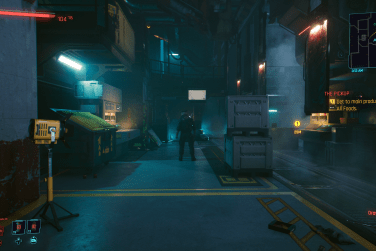
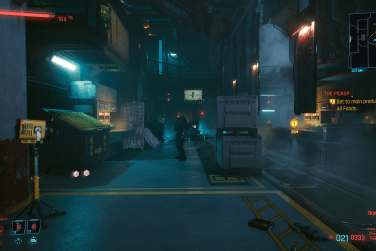
Image credit: CD Projekt Red as featured on Polygon.
At times, this refers to actual in-game clutter. Other times, it consists of mission-related narrative details. More frequently than anticipated, it turned out to be a crate filled with valuable items that we might have overlooked if we hadn’t repeatedly pressed the button, reminiscent of the days in 1996 when we were attempting to save a Works document in the high school media center.
Fulfill additional optional goals.
Without revealing any details, it’s important to note that they influence the gameplay significantly, and these effects can be quite unpredictable.
Here’s a spoiler-free illustration. In a primary mission early in the game, you’re given the choice to either rendezvous with a friend or take a side trip to encounter a new character. Both tasks are connected to the mission. If you opt for the optional route, you’ll encounter a few characters, one of whom influences the conclusion of the main mission.
You may not be aware of the impact that finishing an optional objective will have, but it’s safe to think that it will influence the game in some manner (or at the very least, provide you with new possibilities). Therefore, it’s worth the effort to tackle it. Additionally, completing optional objectives will reward you with some (unspecified) bonus cash for your jobs and gigs later on.

